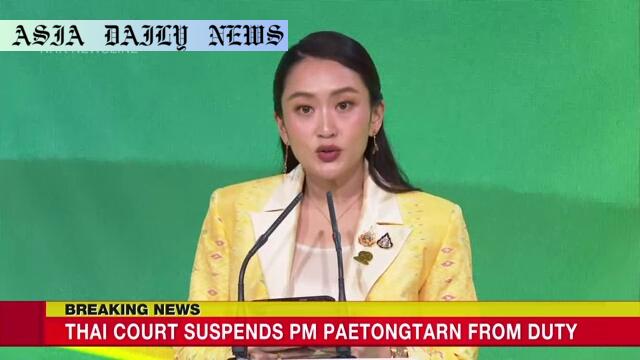Suspension: Thailand’s PM Paetongtarn faces court suspension amidst backlash over leaked phone call with Cambodia’s Senate President.
- Thailand’s Constitutional Court suspends PM Paetongtarn Shinawatra.
- She faces allegations linked to a leaked phone call with Hun Sen.
- Political turmoil deepens as protesters demand her resignation.
- Deputy PM expected to take over as caretaker leader.

The Context of Paetongtarn Shinawatra’s Suspension
On Tuesday, Thailand’s Constitutional Court reached a significant decision, suspending Prime Minister Paetongtarn Shinawatra from her duties amidst allegations of unethical conduct. This move comes after a petition filed by 36 senators accusing her of constitutionally questionable behavior in connection with a leaked phone conversation. This cornerstone issue revolves around a private discussion between Paetongtarn and Cambodian Senate President Hun Sen, during which sensitive topics, including border disputes, were addressed. The controversy primarily escalated due to Paetongtarn’s alleged disparagement of a Thai Army commander during the call.
The suspension is part of an ongoing investigation into whether her actions violated ethical standards as outlined in Thailand’s constitution. Known for its public upheavals and political fragility, the Thai political landscape is further embroiled in turmoil over Paetongtarn’s suspended premiership. The Constitutional Court will deliberate on the petition and deliver a final ruling in the weeks to come. In the interim, a deputy prime minister is expected to step in as caretaker to ensure governmental operations continue without disruptions.
Public Backlash and Political Consequences
The leaked phone call incident has triggered widespread public outrage, with thousands of citizens taking to the streets demanding Paetongtarn’s resignation. The political crisis deepened over the weekend as rallies intensified, showcasing the growing dissatisfaction with her leadership. Protesters have pointed toward the government’s perceived incompetency and mishandling of sensitive border-related issues. These sentiments are further reflected in a recent survey, revealing that fewer than 10% of respondents believed her to be a suitable national leader.
Analysts argue that the leaked conversation may have irrevocably damaged Paetongtarn’s credibility. Her comments about the Thai Army commander have also reportedly fractured trust within key institutions, further compounding the issue. With public approval at a low point and the Constitutional Court involved, Paetongtarn’s political future may hang by a thread. The entire episode underscores an unstable political climate, with broader implications for Thailand’s legislative and executive arms.
Regional Implications: Thailand-Cambodia Relations
In addition to domestic challenges, the scandal has reignited tensions between Thailand and Cambodia. Border disputes, often a sensitive aspect of their bilateral relationship, have found renewed focus due to the leaked phone call. During her conversation with Cambodian Senate President Hun Sen, discussions on territorial disagreements reportedly included comments that failed to honor key Thai military figures.
Diplomatically, such leaks can sow mistrust and strategic ambiguities, especially when leaked remarks appear to favor foreign counterparts over national peers. Experts from the Southeast Asian geopolitical sphere have identified potential repercussions for Thailand’s diplomatic standing in the region. With global eyes watching its current political turmoil, Thailand risks losing credibility both regionally and internationally.
The Path Forward for Thailand
Thailand faces significant challenges ahead, including healing a fractured domestic political environment and restoring public trust. The immediate priority is appointing a caretaker while awaiting the Constitutional Court’s final verdict. However, overarching efforts should focus on stabilizing government operations and addressing public discontent through transparent governance practices.
Moreover, improved communication and conflict resolution strategies are essential to mitigate future crises of this scale. As Thailand navigates its leadership crisis, the broader lesson underscores the importance of ethical leadership in maintaining national and regional stability. Moving forward, addressing both domestic and international concerns must be prioritized to rebuild public confidence and diplomatic trust.



Commentary
A Leadership Crisis of Ethical Proportions
Thailand’s decision to suspend Prime Minister Paetongtarn Shinawatra has significant implications, both for its domestic politics and regional standing. The allegations of unethical behavior tied to a leaked phone call underscore the challenges political leaders often face when navigating sensitive subjects, especially in today’s hyper-connected world. This incident has greatly dented Paetongtarn’s standing, not only within Thailand but on an international level as well.
As political protests rage across the country, the government is left grappling with a crisis that questions its legitimacy and ability to lead. The opposition’s unified stance, along with public frustration, has escalated the stakes for the administration, pressuring them to respond decisively and transparently. These developments highlight the fragility of leadership roles in dynamic democracies like Thailand.
Trust, Transparency, and Governance
At the heart of this crisis lies a fundamental issue of trust. When the prime minister is accused of unethical practices and disparages key national institutions, it tears at the fabric of trust that holds a nation together. Rebuilding this trust will require extensive efforts, strategic diplomacy, and a deep commitment to democratic principles moving forward.
Simultaneously, the leaked phone call raises questions about transparency and governance. For modern leaders, credibility stems not just from public policies but also from personal conduct and integrity. Moving forward, it is imperative for Thailand’s political players to devise mechanisms ensuring greater accountability, ultimately aiming to prevent such fallout in the future.
Regional Ramifications and Hopes for Reconciliation
Regionally, this incident has reopened wounds regarding Thailand and Cambodia’s border disagreements. The fragility of their relationship requires careful handling, particularly during a politically turbulent time. Effective conflict resolution, perhaps paired with mediatory support from regional organizations, could play a vital role in easing these tensions.
Ultimately, while this suspension marks a low point in Thailand’s political trajectory, it also offers an opportunity for rebirth. By championing ethics, fostering reconciliation, and embracing reforms, Thailand has a chance to emerge stronger. Doing so will not just restore the public’s faith but will also cement its position as a resilient regional power.